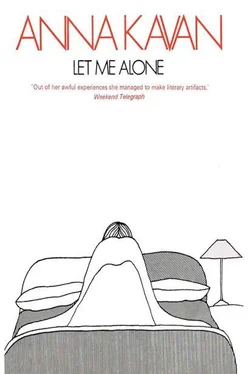Again the other girl smiled her sharp, one-sided smile, rather vinegary.
‘Well, it’s not exactly easy to know you. You’re usually so very obviously otherwise engaged.’
She spoke with sarcasm, not really bitter, but mocking; subtly, definitely derisive.
‘You mean with Rachel?’
‘Yes, with Rachel,’ she said, jeering a little, and accenting the name.
There was an uneasy pause. Anna was trembling on the verge of resentment. But for some reason she couldn’t really feel angry with Sidney and her peculiar mingling of effrontery and diffidence: her assurance and her naive, hidden, wistfulness.
‘Hadn’t you better go to her now?’ said Sidney ironically, her thin cheeks flushing. ‘She’ll be expecting you.’
‘Yes,’ said Anna, and instantly stood up. ‘I think I will go.’
Sidney watched her, with a bold and mocking stare. Then she smiled rather irresistibly, and Anna smiled back reluctant.
‘Good-bye for the moment,’ Anna said.
‘For the moment,’ repeated Sidney, still smiling.
She watched her across the room and until the door closed behind her.
Anna went off with a feeling of pleasure. Pleasure to be going back to Rachel. Pleasure to have got away from Sidney, and yet pleasure at having talked to her. Sidney was intriguing. But she made Anna feel uncomfortable. She had that bright, mocking cynicism that challenged her in some way. Sidney was irritating, almost aggressive; but also there was that curious farouche sort of nervousness about her. And her attractive, one-sided smile that you couldn’t quite trust in, and which promised so much; which, perhaps, was the token of a rare inward warmth. There was nothing easy about her. She was sharp, and stinging and stimulating and would need living up to; she would keep you on your mettle.
Anna felt again, as she had already felt, that Rachel was making her soft, almost victimising her. She was not standing on her own feet. And it seemed to her that Sidney, with her very quick amber eyes had discerned this and was mocking her.
Anna wanted to be friends with Sidney, but Rachel monopolized all her attention. She felt herself in a quandary. It was not easy to break away from Rachel. She did not really want to lose that warm, glorifying passion of tenderness the big, vivid woman was capable of. For her, Rachel was still the goddess, powerful, benevolent, full-limbed, mysterious with a strange power of exaltation and a luxuriant physical magic. Rachel was the goddess-woman to whom she owed her passionate loyalty and gratitude and devotion.
But then she had to reckon with the influence of Sidney, pulling her, pulling her in another direction. Pulling her away. That was what Sidney was doing all the time, under cover of her ironical indifference, pulling her away from Rachel. Trying to force a new liberty upon her. To take away from her the deistic protection of Rachel’s benevolence.
‘I admire Rachel enormously,’ she heard the deep quiet, humorous voice of Sidney asserting. ‘I’m fond of her too. But only in homeopathic doses. I can’t stand much of her at a time. She’s too rich for me, too rich for my blood.’
Anna felt that she was laughing at her and her relations with Rachel. Hard, clean-cut, sharp-tongued, bracing, mocking Sidney, without gentleness or mercy; Sidney with her gruff voice and her curious wild charm; how strange a rival for the goddess!
But a formidable rival the sturdy, dark girl was. She had a poisoned dart of power against Rachel in her boyish body. The power to make the ripe, glorious woman a little ridiculous.
Like a goddess, Rachel appeared beside her, a rich, golden goddess in all the glory of maturity, with a gorgeous, almost voluptuous fullness. Sidney brought out the goddess-ship, the strange physical goddess-ship of Rachael, by contrast with her own youthful, sharp-outlined simplicity, her own hardness.
This was what she tried to do. And it made Anna uncomfortable. The overflowing, soft femininity had always been a little repulsive to her. Now it became also a little absurd, a little embarrassing. She could not bear the warm glisten of tenderness in the big, hazel eyes; or the large, soft, white hands that touched her yearningly with a mysterious soft urgency, possessive. The whole semi-physical spell of the goddess-ship of Rachel had become abhorrent to her.
She gave more and more of her time to Sidney. Rachel said nothing; she would not compete or complain. She had, very much, her dignified pride. But she looked at Anna with darkened eyes, as much as to say that though she would not reproach her the default was bitter.
She watched Anna at first with a kind of hopefulness: on her soft, warm face, and in her hazel eyes was an expression of tender, rather pathetic expectation. She could not believe that she had lost her battle. She was the goddess; the mystery. How should she fail to conquer?
Yes, Rachel was used to looking upon herself as a goddess. But suddenly her divine right was questioned; and by this young limb of a Sidney. Sidney to win a victory over the goddess, to steal away an adorer! What a humiliation!
Rachel did not like it at all. And presently a flame of indignation was lighted in her large eyes. The tenderness, the melancholy softness, died out, and indignation took its place. She left Anna alone.
Anna was glad to get out of the temple, to get away from the spell of the fascination and the mystery, out into the fresh air. But she went out with something added to her by the mysteries; a strong conceit in herself, the nightmare pushed well away into the background.
She very quickly became intimate with Sidney. The intimacy which had budded between them at their first conversation blossomed rapidly into a sort of romantic friendship. There was nothing emotional about their relationship. But a frankness, a freshness, an almost man-to-man breeziness, very free and easy. They teased one another and sharpened their wits upon each other. But there was a good deal of romance in their friendship. The mockery, the intellectual strife between them, did not diminish it. The romance surrounded them like a force generated between them, so that the world around them seemed brighter, and gayer and fuller. So that whatever they did together was interesting and amusing. Sometimes they played childishly fantastic little games with the surface of life. And sometimes they talked seriously and with a sense of importance.
‘I’m sorry we’ve missed the war,’ Sidney said to Anna soon after the armistice had been signed.
Anna was surprised. The war had not meant anything to her except an excuse for tedious restrictions. Ever since she had left Mascarat, Europe had been at war. She knew no other world.
‘Why?’ she asked, her clear eyes watching her friend. ‘It’s been a horribly unpleasant business.’
‘But how exciting!’ said Sidney. ‘Don’t you realize what a wonderful atmosphere there’s been in England all these four years? The change and excitement and all the old things coming to an end. I should have loved to have been in the thick of it all. And instead of that we’ve missed it — missed it by about two years.’
That was like Sidney; that energetic interest in events, that desire for experience. Anna was different. She wanted to appreciate things, to understand them, but all in the abstract, so to speak, without actually experiencing them. And for that reason she was more interested in Sidney as an intelligence than as a personality. Sometimes that militant quality in Sidney, that aggressiveness, alienated her. It jarred upon her.
But Sidney, for all her assertiveness, looked upon Anna with a kind of fascination. In spite of the teasing and the mockery and the man-to-man attitude, Sidney had subtly but definitely put herself in the humbler role. There was that curious hint of deprecation in her manner even while she mocked and swaggered. And a disguised, faithful devotion in her bright, clever-animal eyes.
Читать дальше












